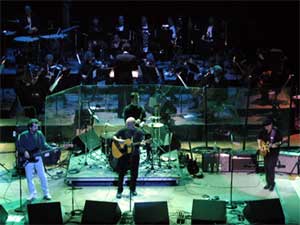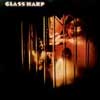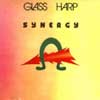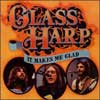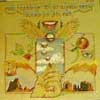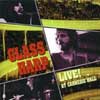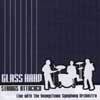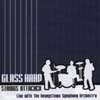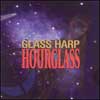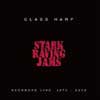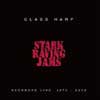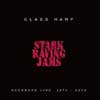Glass Harp
Genre: Pop/Rock/Acoustic
Official Web Site
Glass Harp Bibliography: (click on each album cover to view tracks and Glass Harp lyrics)
Glass Harp Biography In the late '60s and early '70s a power rock trio from Youngstown, Ohio called Glass Harp reached for the stars. They must have made contact, as references to stellar events seem to pervade much of their music. As a reviewer of their debut album observed,"...no fewer than five songs mention the sky, and three of the remaining ones talk about things like stars, rainbows, and the moon."
They were a bare bones group in the tradition of Cream, Jimi Hendrix Experience, and fellowOhio band, The James Gang. But Glass Harp developed a signature sound of their own-a progressive one that allowed the members, collectively and individually, to stretch beyond the confines of standard form; breaks in songs for guitar, bass, flute, and drum solos were de riguere , as extended improvisations that would take the bands performances into the late hours.
The trio's following was particularly amazed by the lighting style and precise technique of the bands 18 year old guitarist Phil Keaggy, who aside from his youth, had the use of only nine fingers. Neither strike impeded his ability to produce highly lyrical solos. Combined with the tasteful, rhythmic bass lines of Daniel Pecchio and the sharp, assertive drumming of John Sferra, Glass Harp created a wall of sound that would thrill sell-out capacities across the upper Midwest and beyond.
While the band dissolved on the cusp of achieving mainstream rock stardom, they garnered a large and loyal regional following. National notoriety followed as they toured with the likes of, Traffic,Yes, The Kinks, Humble Pie, Alice Cooper, Ted Nugent, and Grand Funk Railroad. " They were just the warm-up group," recalls a journalist of the day, "But it was the first time I had heard a local group and felt that I had heard the headline concert."
With the release of their first album came more national attention, and even more enthusiasm back home-none of which was lost on the record company advertising execs, who exploited their burgeoning popularity with such ad copy as;
"The Glass Harp epidemic began about two weeks ago in Ohio and has been spreading so rapidly it has already affected some 36,000 in Cleveland alone. There is conclusive evidence to suggest that a new rock group Glass Harp is responsible for this epidemic. The release of their LP coincides almost exactly with the outbreak of this phenomenon.Contact your MCA Distributor today and become a carrier of the Glass Harp epidemic."
In all, the band's recorded output consisted of three critically- acclaimed LPs- all released on the Decca(MCA) label-Glass Harp, Synergy, and It Makes Me Glad. In spite of their short lived life, the band managed to imprint an indelible mark on the history of rock 'n' roll. Performing with some of the biggest bands of the day on stages ranging from the Filmore to Carnegie Hall.
The seeds of the group were planted in the fall of 1965, when Keaggy and Sferra met and became fast friends as eighth graders. "We fancied ourselves as being like 'the little Beatles,' " recalls Keaggy. "John looked a little like John Lennon, and I looked a little like Paul. So we'd get together and sing Beatles and Peter and Gordon songs. And though John was a drummer, he also played guitar."
It would be some time, though, before the pair would collaborate in a band setting. Keaggy continued to hone his chops in the years that followed playing with such groups as The Volume Four, The Squires, and The New Hudson Exit, which took the young Keaggy to California. By his junior year, he returned on his own to Ohio, where he was reunited with Sferra, and with bassist Steve Markulin, formed Glass Harp (a knock-off from the literary classic The Grass Harp).
The dedicated attention of Geoff Jones, the group's first manager, was instrumental in Glass Harp's successful groundbreaking days. More importantly, Jones held the band accountable to realizing its vision from its formative rehearsals in Sferra's basement to the very details of their stage presentation.
John Sferra recalls the trio's first paying date. "It was in The Bellfrey Roller Arena, 1968. It was cool not to play your first gig in your own home town, so we went there. I felt like a nerd that night, because I had grown my hair down to my collar, but my dad made me get it cut. I ended up with a quarter inch haircut. I would have looked great today!"
The period would mark the first of several transitional times for Keaggy, whose adolescent years were at best, unstable; for almost a year during his teens, he lived away from home. "That was at a time when I lived in many households," he recalls. "I lived with John; I stayed at my brother Karl's; I went to my brother Dave's; I stayed with various other family friends. I ended up moving in with my brother Bill, who was willing to put up with me! I was like a little vagabond teenager. I didn't mean to cause trouble, but I was fairly restless and discontented until I was able to find my niche."
Shortly after the band recorded its first demo project, John Carazino took over the bass seat, which would be yielded once more, this time to The Poppy's Daniel Pecchio. "This little band, Glass Harp," remembers Pecchio, "opened up for us a couple of times. I was really impressed with John's playing, and Phil's reputation always preceded him."
Keaggy adds, "Dan was the older one. We respected him; he seemed like the smart one, and he was always trying to look out for the best for us."
Pecchio was a bit of a late bloomer, musically speaking, having taken up the bass while he was a freshman at Youngstown State University. He was obviously a quick study. In addition to bass, Pecchio brought flute, harmonica, and a very strong voice to the group, which by now, had crystallized. Managers Chip Killinger and Bill Able entered the picture, and the Glass Harp package was made complete; the band was on its way.
Ironically, as Glass Harp's popularity began to rise, it posed problems for Phil and John, both high school seniors at the time. The demands of the road meant both would have to finish their schooling via correspondence courses.
A major turning point for the trio was their winning of an Ohio area's "Battle of the Bands." One of event's judges happened to be an associate of the celebrated producer Lewis Merenstein, whom he alerted to the hot young threesome. At the time, Merenstein was fresh from producing Van Morrison's Moondance, and had just been voted Producer of the Year by Rolling Stone. Merenstein was persuaded into flying down from New York to see what the fuss was all about. Upon hearing the band perform, so inspired was Merenstein that he signed Glass Harp to a multi-record deal. A short time later, the band found itself in New York's Greenwich Village, recording its first album at Jimi Hendrix' Electric Ladyland Studio. It was a dream come true. Regrettably, Hendrix died the day before the record was completed.
Another of the group's shaping events was more tragic in nature. Recalls Daniel, "Glass Harp had a charmed history. Reality slapped us in the face, though, when Phil's mother died in February, 1970. She helped the band with the books, and she really felt that we were going somewhere. After her death, it changed Phil's life and the whole direction of the band."
The tragedy set Phil on a completely different course-a course that he could not completely reconcile with his budding rock star stature. The shock of his mother's death, combined with the comfort and personal ministry of his sister, led Phil to embrace Christianity.
Still, the band carried on, expounding its musical message wherever it played. Recalls Sferra, "There was no such thing as a Christian band then, yet Phil was speaking in bars to our audience about Christian doctrine, which Dan and I also believed. Sometimes the promoter or bar owner would flinch, but there would always be a full house. When you're successful, you can get away with a lot of things!"
The band's second album, Synergy, followed with the attendant touring and press coverage. Plans were put in place to produce a third album-a live project-to be recorded at Carnegie Hall. It was to be a high point for the threesome. "Here we go!" says Keaggy, remembering the event. "All the way to the big town."
"All musicians-even we '70s anti-establishment rock 'n' rollers," adds Pecchio, "are aware of the mystique of Carnegie Hall. For generations, a performance at Carnegie Hall was a banner that proclaimed, 'You have arrived!' All of this was not lost on us, or our producer Lewis Merenstein, who made arrangements to record the event. This was the gig of our lives-and it was going to be recorded, too!"
The Kinks had top billing that night. The Glass Harp were to open the evening with a 45-minute set, which would actually run eight minutes overtime. Although the band had developed visual and verbal cues to keep up with each other's improvisations-"it was like calling audibles on stage," says Pecchio-things still sometimes got away from them at times. "Phil never could end a song!" he adds, laughing.
"I remember being very nervous," says Sferra, "wondering if the audience would accept us and our music. Friends told me that if we played half as well as we had in other concerts, we would be fine. I hoped they were right. This was a New York City audience! They were notorious for letting a performer know just what they thought. No polite applause here. If they didn't like you, you got booed off the stage."
Putting the pressure behind him, Sferra decided to try enjoying himself. "After all, many musicians strive for a long time to play this venue. But I was only 19. That didn't help! It made me feel even more insecure. Was I really up to this? Did I even deserve this privilege? Thank God I didn't have to go this alone. I had my 'brothers in arms,' Daniel and Phil. Whatever happened, the humiliation could only last 45 minutes, our scheduled playing time."
Sferra loosened up a bit upon hearing of Dean Bassett's (Daniel's father-in-law) activities around the hall. "He was recording everything he could get a microphone on: the hotel kitchen sounds, cabbies, even toilets flushing! 'For posterity,' you see. And it's with thanks to Mr. Bassett's archival foresight that this release was even made possible."
Finally, zero hour had arrived. Al Pethal, one of the band's road managers, announced the group, and they got down to it. "Halfway through Look In The Sky," says John, "I forgot my nervousness, and had a wonderful time making music with Phil and Daniel."
Pecchio, not having much experience playing symphony halls, had expected Carnegie Hall's size to be more on par with its legendary status. "I was surprised at how small it seemed to be," he says. "After all, we were used to playing venues of ten- to twenty-thousand people. We were given a private tour, and to compare Carnegie Hall to the large venues we played would be like comparing a Faberge Egg to a drug store knick-knack."
Standing on one of the balconies, Daniel imagined Caruso, and every great artist before and after him, performing on that stage. "It was a profound experience," he says, "equaled only to playing that first note at the beginning of our set."
Pecchio adds that Glass Harp was a unique live band, and playing Carnegie Hall certainly qualified as a unique experience. "Together they provided a wonderful evening, preserved on tape. We were truly blessed, as members of Glass Harp, to be given the opportunity to know each other personally, and to have shared our gifts with each other and our friends. Carnegie Hall was one of many spiritual evenings we had together."
The experience was a sobering one for Keaggy, as well. Following the soundcheck, he walked off by himself to an upper tier of the hall where he found a vacant room. "I went in and knelt down and prayed there in the dark," he remembers. "I asked God to bless the concert. It was strange, because I didn't know how I felt about it all. On one hand, I was excited; on the other hand, I was a bit scared. I didn't know where this whole thing was headed. We had recorded two albums up to that point, and this was to be our live album. And there was a lot of pressure with that, so I was just trying to compose myself. I had been a Christian for just a year, and the thing that was most on my mind, as a youngster with this newfound faith and his heart lifting up to God was, 'What can I do to please You tonight with my instrument? I had mixed feelings about it all."
Anxious as the preliminary events were, they didn't interfere with the performance, which was quintessentially Glass Harp. "It was us playing like we really could play on a good night," says Phil. "You can hear our nervousness in the music at the beginning; we were a bit on edge. But that soon passed, and we got down to business. I think the concert also captured the quirky personality of Glass Harp's music-and we were a quirky threesome. Dan was a very percussive bass player, and John was like a wild horse. He had that kind of strength and energy, and thankfully, he always found a way to come back to 'one.' We were able to work within each others' musical styles in large part because we grew up playing together. We were a good group for our time-and for our years. We were very experimental; we explored a lot of places. Whenever I took off into exploring the galaxy, they just went along for the ride. And they would contribute to my music very generously. That's what we had. People sensed something of Glass Harp that we were very generous with each other, and we enjoyed each others' playing. We knew that each of us could not do the others' part. That's what makes good bands good bands."
With the set behind them, Phil seized the opportunity to take in the Kinks' performance. "They had really big amps," he remembers. "Hi-Watts, I think. They just dwarfed our equipment. Dan had his Traynor bass amp with 8" speakers, and I had my Les Paul and two beefed-up Twin Reverbs. But the sound of our equipment was really good. I think the audience really enjoyed it; they responded really well, and I was quite pleased with the evening."
Following the concert, the trio made their way to the mobile recording unit parked outside to hear the result. Says Keaggy, "Lewis Merenstein, our producer, was there, and we listened to it as it was playing back. It sounded wild. We were really excited about it."
As it turned out, though, it was decided that another studio album should be scheduled for release ahead of the live project. The outcome, It Makes Me Glad, would be the third and final contemporary release for the band.
"We recorded that album," says Phil, "with everyone knowing that my intentions were to leave sometime in the summer. And I did leave. My last concert date with the fellas was August 8, 1972 in New York."
"There was a lot of compromise on everyone's part at that time," remembers Sferra. "Phil realized that he had to go sort himself out, get away, and just start all over."
And get away, he did. Keaggy married and moved to California, where he joined the pioneering Christian band, Love Song. That connection would lead him to relocate again, this time to upstate New York, where he became involved with a Christian community known as Love Inn. "When I left Glass Harp," says Phil, "people thought I had either died or gone off to join a monastery!" In reality, a second legendary musical career was unfolding.
Glass Harp's efforts to fill Keaggy's slot in 1972 were unsuccessful. While outstanding guitarist Tim Burks and violinist Randy Benson came in to fill the void, the magic just wasn't there. The magic, it seemed, was the rare synergism between Sferra, Pecchio, and Keaggy. A year or so later, Glass Harp officially disbanded. Sferra moved on to join bands in northeastern OH, while Pecchio, Jonah Koslen, and Michael Stanley formed another regional giant, The Michael Stanley Band. Several years later, Pecchio and Sferra would join forces again with The Motion, a nine-member R&B/Motown review.
The trio has been reunited on several occasions, performing concerts in Akron and Cleveland in 1981 and 1984, and in impromptu settings with John and Dan joining Phil on stage when his concert tours brought him to town. Other events are planned, as the group's musical paths sometimes cross.
|


